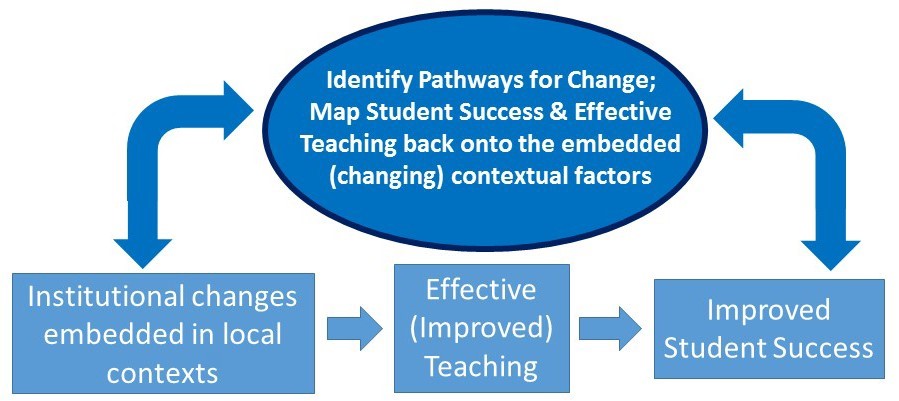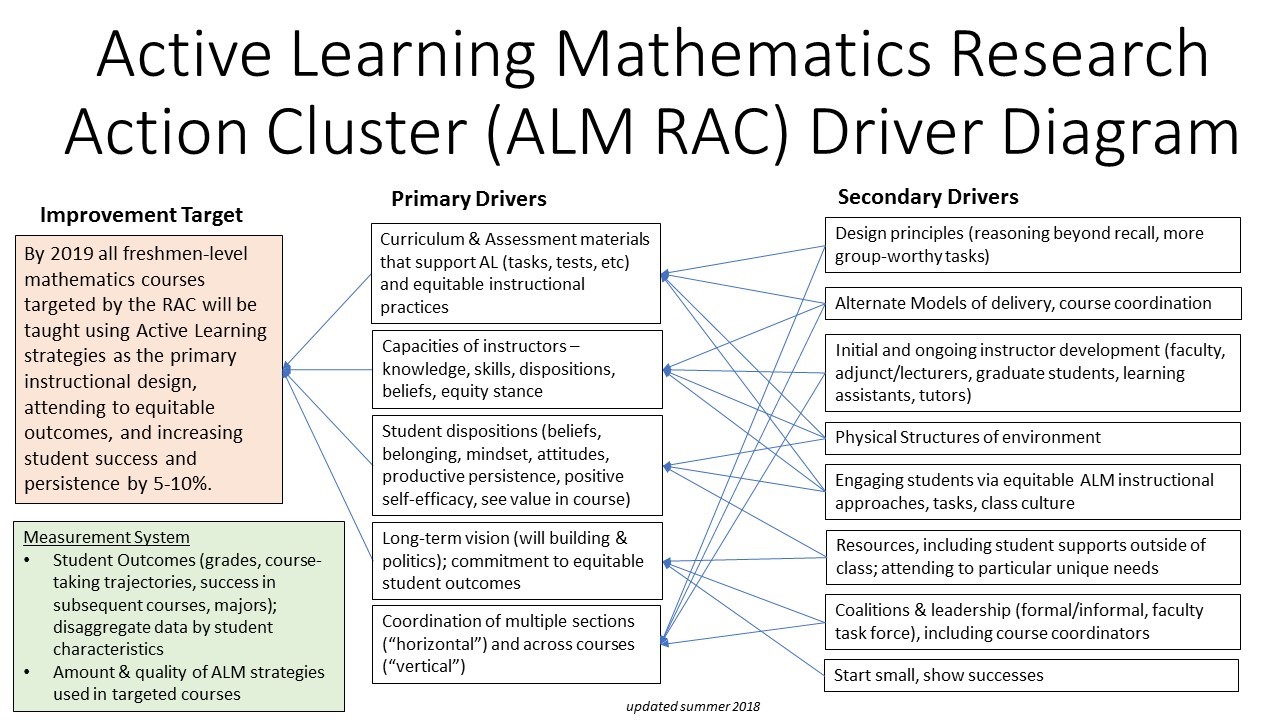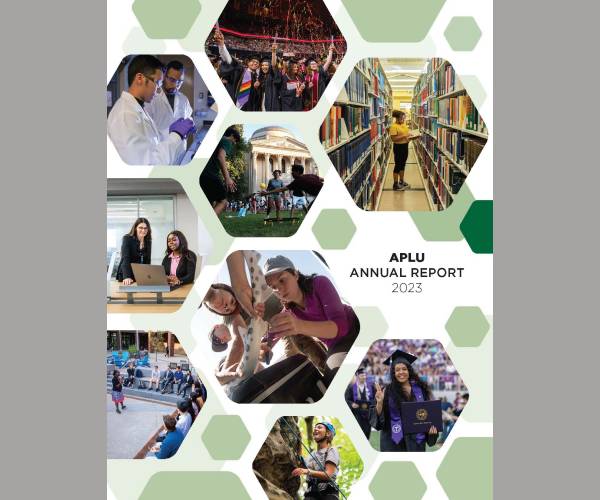Active Learning Mathematics RAC
Problem Addressed
General Approach
Who We Are
Opportunities for Engagement
Resources
Problem Addressed
Student success in undergraduate mathematics has significant implications for whether students choose to continue into STEM majors and future related careers. Even for those students who do not choose to major in mathematics, science or engineering, success in entry-level undergraduate mathematics courses such as calculus can make or break students’ decisions to persist in postsecondary education.
The Characteristics of Successful Programs in College Calculus (Bressoud, Carlson, Mesa, & Rasmussen, 2013) showed the percentage of students with grades of D, F or Withdraw ranged from an average of 25% at Ph.D.-granting universities to an average of 37% at regional comprehensive universities. We are committed to improving students’ achievement in and dispositions toward mathematics using models for Actively Learning Mathematics.
With respect to the MTE-Partnership Guiding Principles, the Active Learning Mathematics Research Action Cluster (ALM RAC) involves Commitments by Institutions of Higher Education through Institutional Focus, Disciplinary Partnerships, and Institutional Support for Faculty. The ALM RAC also addresses the guiding principle of Candidates’ Knowledge and Use of Mathematics through future candidates’ engagement in Mathematical Practices in introductory level undergraduate mathematics courses, to deepen their Knowledge of the Discipline. Excellent introductory mathematics courses also have the potential to encourage more students to consider becoming secondary mathematics teachers (or at least to stop discouraging potential future teachers).
General Approach
Our working theory of change is represented in the following diagram.

The overarching goal is to improve student success with undergraduate mathematics, starting with the Pre-calculus through Calculus 2 sequence (P2C2). This is accomplished through effective teaching practices, which are supported by learning environments that are more conducive to student interaction, reasoning, and problem solving and the use of instructional resources to support ALM. Faculty buy-in and institutional leadership is developed to support Graduate Teaching Assistant training. Also, for many campuses, undergraduate learning assistants are used to support student work with group activities and enhance student engagement in mathematical activity.

Who We Are
- Cal Poly Pomona: Laurie Riggs
- California State Fullerton: Alison Marzocchi, David Pagni, Roberto Soto
- Colorado Boulder: David Grant, Nancy Kress, Faan Tone Liu, Rob Tubbs, David Webb*
- Colorado State: Janet Oien
- California State, Chico: Christine Herrera
- Florida International: Rocio Benabentos, Maria Campitelli, Adam Castillo, Maria Fernandez, Jerry Hower, Laird Kramer, Goeff Potvin, Charity Watson
- Fresno State: Lance Burger
- Hawaii-Manoa: Monique Chyba, Mirjana Jovovic, Sarah Post
- Kennesaw State: Kadian Callahan, Belinda Edwards
- Middle Tennessee State: James Hart
- Nebraska-Lincoln: Allan Donsig, Rachel Funk, Wendy Smith*, Nathan Wakefield
- Nebraska at Omaha: Janice Rech, Michael Matthews
- Northern Arizona: Angie Hodge
- San Diego State: Janet Bowers, Michael O’Sullivan, Chris Rasmussen, Daniel Reinholz,
Matt Voigt - South Carolina: Sean Yee
- Tuskegee: Lauretta Garrett, Ana Tameru
- Utah State: KimberLeigh Hadfield
- West Virginia: Nicole Infante, Vicki Sealey
- Western Michigan: Melinda Koelling, Tabitha Mingus
*RAC Co-Leaders
Opportunities for Engagement
You can contact the RAC leaders to discuss how you might get involved. We recommend you start small—check out the resources below and start talking to others at your site. Our RAC members are active at the Joint Math Meetings (JMM) and Research in Undergraduate Mathematics Education (RUME), so you can usually catch us presenting there. You may want to attend a hands-on workshop focused on active learning, such as those put on by the Academy of Inquiry Based Learning . Some RAC materials for use with precalculus to calculus 2 classes (P2C2) are available online . The ALM RAC efforts overlap with the NSF-Funded SEMINAL grant (Student Engagement in Mathematics through an Institutional Network for Active Learning ), which is studying institutional change and how departments can change their cultures so that actively engaging students is the new normal.
Resources
Recommended Readings to Initiate ALM Efforts
Elrod, S., & Kezar, A. (2016). Increasing student success in STEM: A guide to systemic institutional change. Washington, DC: Association of American Colleges and Universities. https://www.aacu.org/publications-research/publications/increasing-student-success-stem-guide-systemic-institutional |
Kezar, A. (2013). How colleges change: Understanding, leading, and enacting change. New York: Routledge. http://www.adriannakezar.com/publications/books |
Bryk, A. S., Gomez, L., Grunow, Al., & LeMahieu, P. (2015). Learning to improve: How America’s schools can get better at getting better. Boston: Harvard Education Publishing. https://www.carnegiefoundation.org/resources/publications/learning-to-improve/ |
Hayward, C. N., Kogan, M., & Laursen, S. L. (2016). Facilitating instructor adoption of inquiry-based learning in college mathematics. International Journal of Research in Undergraduate Mathematics Education, 2, 59-82. https://link.springer.com/article/10.1007/s40753-015-0021-y |
Freeman, S., Eddy, S. L., McDonough, M., Smith, M. K., Okoroafor, N., Jordt, H., & Wenderoth, M. P. (2014). Active learning increases student performance in science, engineering, and mathematics. Proceedings of the National Academy of Sciences, 111(23), 8410-8415. http://www.pnas.org/content/111/23/8410 |
Laursen, S. L., Hassi, M.-L., Kogan, M., & Weston, T. J. (2014). Benefits for women and men of inquiry-based learning in college mathematics: A multi-institution study. Journal for Research in Mathematics Education, 45(4), 405-418. https://www.jstor.org/stable/10.5951/jresematheduc.45.4.0406 |
Bressoud, D., Carlson, M. P., Mesa, V., & Rasmussen, C. (2013). The calculus student: Insights from the Mathematical Association of America national study. International Journal of Mathematical Education in Science & Technology, 44(5), 685-698. https://www.maa.org/sites/default/files/pdf/cspcc/InsightsandRecommendations.pdf |
MAA Instructional Practices Guide (2017). Retrieved from https://www.maa.org/programs-and-communities/curriculum%20resources/instructional-practices-guide |
ALM RAC-Related Publications
Smith, W. M., Callahan, K., Mingus, T., & Hodge, A. (2020). Active learning mathematics research action cluster. In W. G. Martin, A. Lischka, W. M. Smith and B. R. Lawler (Eds.), The Mathematics Teacher Education Partnership: The power of a networked improvement community to transform secondary mathematics teacher preparation (pp. 143-178). Volume 4 in B. Benken (Ed.), Association of Mathematics Teacher Educators Professional Book Series. Charlotte, NC: Information Age Publishing. https://amte.net/content/mathematics-teacher-education-partnership-power-networked-improvement-community-transform |
Smith, W. M., Callahan, K., Strayer, J., Jones, R. S., & Augustyn, L. C. (Eds.) (2019). Proceedings of the Eighth Annual Mathematics Teacher Education Partnership. Washington, DC: Association of Public and Land grant Universities. [multiple chapters about ALM RAC] |
Smith, W. M., Lawler, B., Strayer, J., & Augustyn, L. C. (Eds.) (August 2018). Proceedings of the Seventh Annual Mathematics Teacher Education Partnership. Washington, DC: Association of Public and Land grant Universities. [multiple chapters about ALM RAC] http://www.aplu.org/projects-and-initiatives/stem-education/mathematics-teacher-education-partnership/mtep-conferences-meetings/mtep7.html |
Smith, W. M., Lawler, B., Bowers, J., & Augustyn, L. C. (Eds.) (2017). Proceedings of the Sixth Annual Mathematics Teacher Education Partnership. Washington, DC: Association of Public and Land grant Universities. [multiple chapters about ALM RAC] http://www.aplu.org/projects-and-initiatives/stem-education/mathematics-teacher-education-partnership/mtep-conferences-meetings/mtep6.html |
Lawler, B. R., Ronau, R. N., & Mohr-Schroeder, M. J. (Eds.). (2016). Proceedings of the fifth annual Mathematics Teacher Education Partnership conference. Washington, DC: Association of Public and Land-grant Universities. [multiple chapters about ALM RAC] http://www.aplu.org/projects-and-initiatives/stem-education/mathematics-teacher-education-partnership/mtep-conferences-meetings/mtep5.html |
Apkarian, N., Bowers, J., O’Sullivan, M., & Rasmussen, C. (2018). A case study of change in the teaching and learning of Precalculus to Calculus 2: What we’re doing with what we have. PRIMUS, 28(6), 528-549. https://www.tandfonline.com/doi/abs/10.1080/10511970.2017.1388319 |
Lai, Y., Smith, W. M., Wakefield, N. P. Miller, E. R., St. Goar, J., Groothuis, C. M., & Wells, K. M. (2016). Characterizing mathematics graduate student teaching assistants’ opportunities to learn from teaching. In J. Dewar, P. Hsu, & H. Pollatsek (Eds.) Mathematics education: A spectrum of work in mathematical sciences departments (Chapter 6, pp. 73-88), Association for Women in Mathematics Series. Switzerland: Springer International Publishing. https://www.springer.com/us/book/9783319449494 |
Wakefield, N., & Smith, W. M. (2016). Enriching Student’s Online Homework Experience in Pre-Calculus Courses: Hints and Cognitive Supports. In T. Fukawa-Connolly (Ed.), Proceedings of the 19th Research in Undergraduate Mathematics Education Conference, Pittsburg, PA. http://sigmaa.maa.org/rume/Site/Proceedings.html |




Stay Connected
X (formerly Twitter)
Facebook
YouTube
LinkedIn
RSS